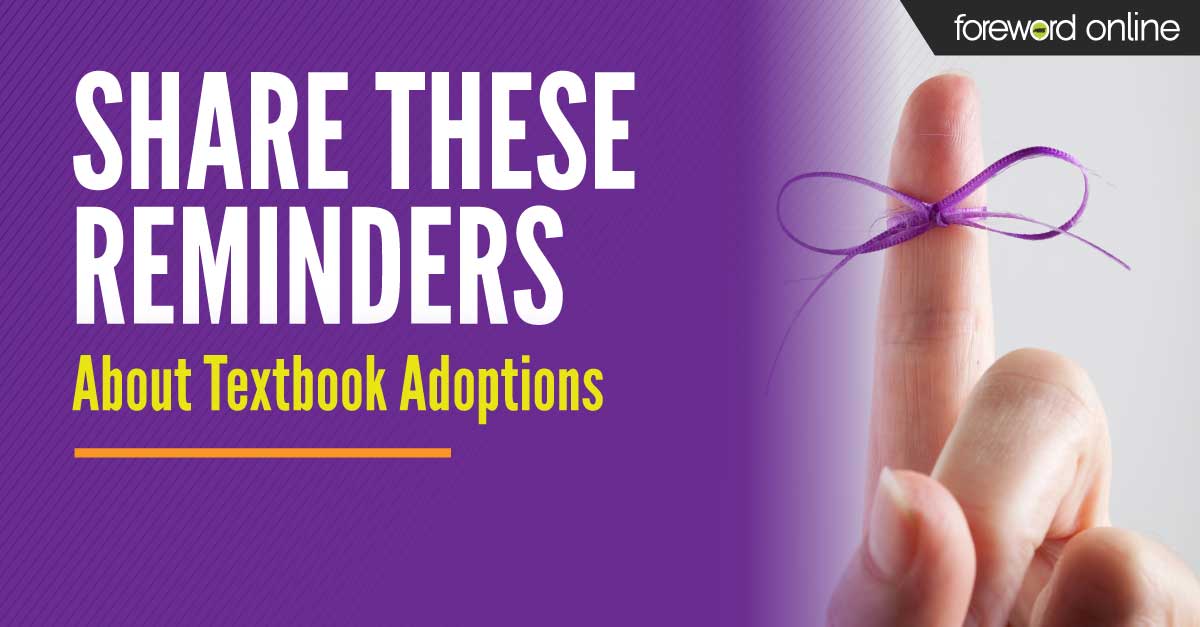On-schedule faculty adoptions can have a big impact on your campus. Whether the adoptions are early, on-time, late or change at the last minute, they affect everything from students and store staff to retention rates. That’s why it is important to develop a good, reliable process for communicating with faculty about adoptions..jpg?width=1200&height=627&name=A-Guide-to-Communicating-With-Faculty-About-Adoption-Deadlines_FO-Header_Proof-v4_230922%20(1).jpg)
3 paths for communicating adoption deadlines
When working with faculty adoptions, there are really three approaches a store can take: passive, direct and indirect. It is possible that stores will have to use all three methods to increase their on-time adoptions rates. Let’s take a closer look at each form of communication.
- Passive – Email reminders can be a great tool for educating faculty about why adoption deadlines seem so early and how they impact students. However, email also relies on busy faculty reading the communication from the college store. While that is ideally the case, it may not be practical to simply depend on this form of communication. To cast a wider net, stores might need to implement more communication strategies.
- Direct – A direct approach could help grab faculty’s attention. Call or schedule a time to meet with faculty members who haven’t made their adoptions. You can explain textbook adoption deadlines, answer questions and/or walk them through the adoption process. This person-to-person communication strategy helps humanize the bookstore and adds a sense of urgency.
But even a direct approach may not be enough to reach all faculty members. College stores might need to take another step to get the adoptions they need. - Indirect – As we said earlier, adoptions deadlines have a wide-reaching impact on the entire school community. Late adoptions can lead to increased student costs (there is no time to look for lower cost course materials and current student buyback values may be lower), the bookstore cannot guarantee books will be available for students (backorders, shipping delays, etc.), and costs to the college store increase (increased shipping costs, increased acquisition costs, staff time, etc.)
So how can college stores avoid this? If emails and person-to-person conversations haven’t helped get the adoption, it might be time to speak with the department chair, dean or provost. Asking someone who directly works with faculty every day to help get those last adoptions turned in can result in much higher on-time adoption rates.
We recommend establishing this relationship with department chairs, deans and/or provost prior to the adoption season. Explain why adoption deadlines exist, how your store’s communication plan works and at what point you might need their assistance. How many times will you reach out to faculty and what methods will you use? When will you come to them for help when adoptions haven’t been made? Do they have any other suggestions about a good way to reach faculty?
“Getting instructor support is my best advice. Work with the deans and get as much support as you can because they have sway over faculty. If you send the email, it’s just another nagging email from the bookstore. However, when the dean sends it, that is your boss telling you that you need to do something. It makes a huge difference. And for students, it’s important that they have all that information upfront,” Peninsula College Director of Enterprise Services Camilla Rico
Read about Peninsula College Bookstore’s early textbook adoptions.
What do on-time adoptions actually do for students?
As part of the bookstore, you know the impact late faculty adoptions can have on course material costs. However, faculty might not be fully aware. Here are a few reminders to share with faculty about how on-time textbook adoptions benefit students.
Lower costs
With a variety of formats, the price range for a single title can be significant. If faculty are willing to work with the bookstore, it is easier to provide students with low-cost options which helps ensure everyone has affordable access to the materials that best fit their learning style. When adoptions are late or changed at the last minute, students will spend more, might have to navigate backorders and/or not have their materials in time for class which can impact their grade and ability to keep up.
Better buyback prices
Take some time to simply explain to faculty how buyback works in relation to their adoptions. After the adoption is made for the next term, your store knows that there will be a demand for that inventory, meaning you will offer students a higher retail buyback value rather than the wholesale buyback value. Furthermore, receiving this end-of-term inventory helps lower acquisition costs for the following term which contributes to lower student costs.
More books in stock
Late adoptions and last-minute changes not only cost students more money, but they also lead to a scarce supply. Stores need time to find the requested materials and have them shipped. Last minute changes often result in higher priced materials, higher shipping costs and delays in getting materials into student hands.
Backorders can also result in lost sales because students will look to online competitors for the materials, which introduces more challenges that students could face, including ordering/receiving the wrong books, long shipping delays and counterfeit materials.
What has been your store’s best method for increasing your faculty adoption rates? We want to hear from you. Let us know in the comments.





